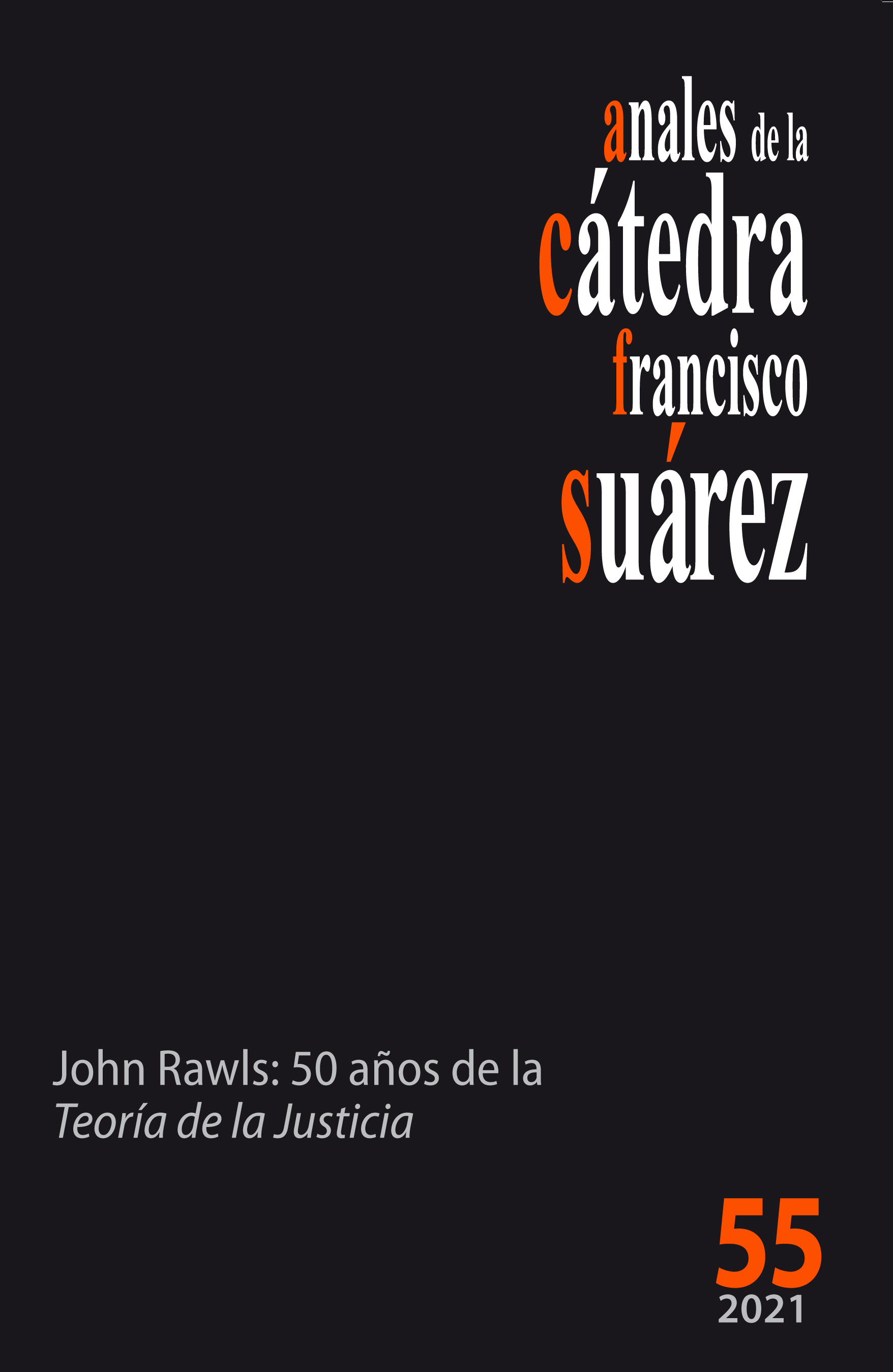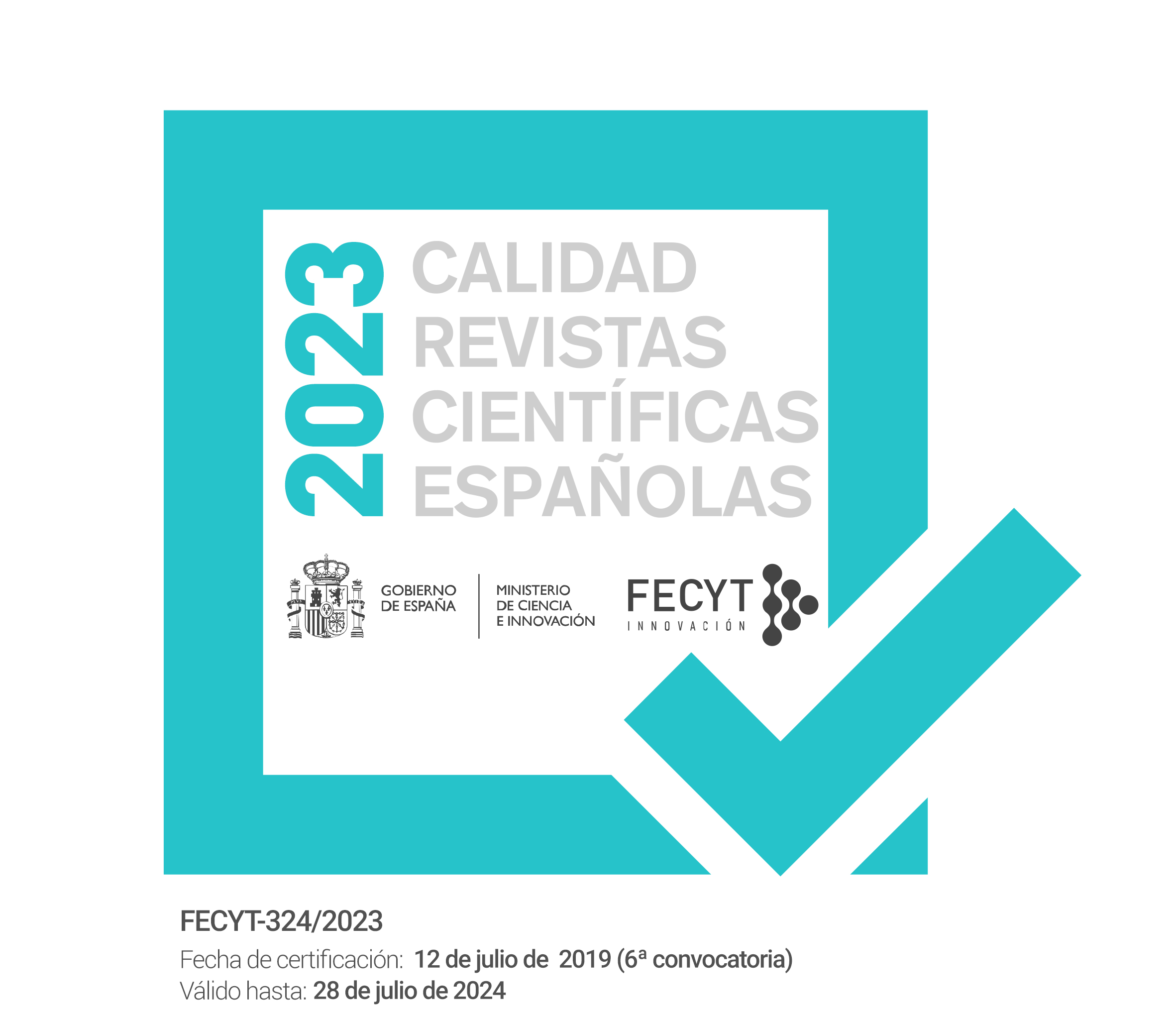Rawls y la cultura pública como base de una concepción política
DOI:
https://doi.org/10.30827/acfs.v55i0.15561Palabras clave:
Rawls, Cultura Pública, Common Sense, Equilibrio Reflexivo, Justificación, Universalismo, Particularismo, Relativismo y EtnocentrismoResumen
Este trabajo examina los diferentes reparos que el recurso a las ideas procedentes de la cultura pública como base de su concepción de la justicia le ha procurado a Rawls. Ese examen se propone establecer dos conclusiones. Primera, frente a quienes sugieren que, con la apelación a tales fundamentos, la solidez del método de justificación que Rawls articula se resiente gravemente y los que esgrimen que, con esa apelación, Rawls renuncia a las pretensiones de universalidad que son consustanciales a la doctrina liberal, intenta poner de manifiesto que el papel que esas ideas cumplen en la justificación de una concepción política de la justicia como la suya únicamente muestra la congruencia que la obra de Rawls exhibe en la manera de entender la naturaleza de la justificación y la clase de elementos sobre los cuales se articula. Segunda, frente a quienes sostienen que el método de justificación empleado por Rawls entraña alguna forma de relativismo o etnocentrismo, trata de evidenciar que ese método no conduce a ese tipo de posiciones, por más que tome como base nuestros juicios considerados y nociones políticas fundamentales.
Descargas
Citas
AYER, A. J. (1954). Philosophical Essays. London: Macmillan.
AYER, A. J. (1969). Metaphysics and Common Sense. London: Macmillan.
BAYNES, Kenneth (1992). The Normative Grounds of Social Criticism. Kant, Rawls, and Habermas. Albany, N.Y.: State University of New York Press.
BRANDT, Richard B. (1979). A Theory of the Good and the Right. Oxford: Clarendon Press.
BRINK, David O. (1987). Rawlsian Constructivism in Moral Theory. Canadian Journal of Philosophy, Vol. 17, No. 1 (Mar.), pp. 71-90.
BRINK, David O. (1989). Moral Realism and the Foundations of Ethics. Cambridge: Cambridge University Press.
D’AGOSTINO, Fred (1988). Relativism and Reflective Equilibrium. The Monist, Vol. 71, No. 3 (Jul.), pp. 420-436.
DANIELS, Norman (1979). Wide Reflective Equilibrium and Theory Acceptance in Ethics. The Journal of Philosophy, Vol. 76, No. 5 (May), pp. 256-282.
DANIELS, Norman (1980). Reflective Equilibrium and Archimedean Points. Citado por J. Angelo Corlett (ed.). Equality and Liberty.
Analyzing Rawls and Nozick (pp. 90-109). Londres: Macmillan, 1991.
DANIELS, Norman (1996). Justice and Justification. Reflective Equilibrium in Theory and Practice. Nueva York: Cambridge University Press.
DEPAUL, Michael R. (1986). Reflective Equilibrium and Foundationalism. American Philosophical Quarterly, Vol. 23, No. 1 (January), pp. 59-69.
DOPPELT, Gerald (1989). Is Rawls’s Kantian Liberalism Coherent and Defensible? Ethics, Vol. 99, No. 4 (Jul.), pp. 815-851.
FREEMAN, Samuel (ed.) (2003). The Cambridge Companion to Rawls. Nueva York: Cambridge University Press.
GALSTON, William A. (1982). Moral Personality and Liberal Theory: John Rawls’s «Dewey Lectures». Political Theory, Vol. 10, No. 4 (Nov.), pp. 492-519.
GALSTON, William A. (1989). Pluralism and Social Unity. Ethics, Vol. 99, No. 4 (Jul.), pp. 711-726.
HABERMAS, Jürgen (1991). Aclaraciones a la ética del discurso, trad. cast. de José Mardomingo. Madrid: Editorial Trotta, 2000.
HABERMAS, Jürgen (1996). «Razonable» versus «Verdadero», o la moral de las concepciones del mundo. En Jürgen Habermas y John Rawls, Debate sobre el liberalismo político (pp. 147-181), trad. cast. de Gerard Vilar Roca. Barcelona: Ediciones Paidós/ I.C.E. de la U.A.B., 1998.
HABERMAS, Jürgen (2000). El giro pragmático de Richard Rorty. En Richard Rorty y Jürgen Habermas. Sobre la verdad: ¿validez universal o justificación? (pp. 81-141). Buenos Aires: Amorrortu Editores, 2007.
HAMPTON, Jean (1989). Should Political Philosophy Be Done without Metaphysics? Ethics, Vol. 99, No. 4 (Jul.), pp. 791-814.
HAMPTON, Jean (1994). Postscript: The New Reliance on the «Reasonable». En C. F. Delaney (ed.). The Liberalism-Communitarianism Debate: Liberty and Community Values (pp. 176-187). Lanham (Maryland): Rowman & Littlefield.
HARE, R. M. (1973). Rawls’ Theory of Justice –I. The Philosophical Quarterly, Vol. 23, No. 91 (Apr.), pp. 144-155.
LITTLE, Daniel (1984). Reflective Equilibrium and Justification. The Southern Journal of Philosophy, Vol. 22, No. 3 (Fall), pp. 373-387.
LONG, Graham (2004). Relativism and the Foundations of Liberalism. Exeter: Imprint Academic.
MACINTYRE, Alasdair (1981). After Virtue. A Study in Moral Theory. London: Duckworth.
MACINTYRE, Alasdair (1984). Is Patriotism a Virtue? En Derek Matravers y Jon Pike (eds.). Debates in Contemporary Political Philosophy. An Anthology (pp. 286-300). Nueva York: Routledge & The Open University, 2003.
MOORE, Margaret (1993). Foundations of Liberalism. Oxford: Clarendon Press.
MULHALL, Stephen and SWIFT, Adam (2003). Rawls and Communitarianism. En Samuel Freeman (ed.), 2003, pp. 460-487.
NEURATH, Otto (1921). Anti-Spengler. En Id. Empiricism and Sociology (pp. 158-213), edited by M. Neurath and R. S. Cohen, translations from the German by P. Foulkes and M. Neurath. Dordrecht: Reidel, 1973.
NEURATH, Otto (1932). Protokollsätze. Erkenntnis, Vol. 3 (Jan. 1), pp. 204-214.
NIELSEN, Kai (1993). Relativism and Wide Reflective Equilibrium. The Monist, Vol. 76, No. 3 (July 1), pp. 316-332.
NINO, Carlos S. (1989a). Ética y derechos humanos. Un ensayo de fundamentación. Barcelona: Editorial Ariel.
NINO, Carlos S. (1989b). El Constructivismo Ético. Madrid: Centro de Estudios Constitucionales.
O’NEILL, Onora (1988). Ethical Reasoning and Ideological Pluralism. Ethics, Vol. 98, No. 4 (Jul.), pp. 705-722.
O’NEILL, Onora (1989). Constructions of Reason. Explorations of Kant’s Practical Philosophy. Cambridge: Cambridge University Press.
O’NEILL, Onora (1996). Towards justice and virtue. A constructive account of practical reasoning. Cambridge: Cambridge University Press.
O’NEILL, Onora (1997). Political Liberalism and Public Reason: A Critical Notice of John Rawls, Political Liberalism. The Philosophical Review, Vol. 106, No. 3 (July), pp. 411-428.
O’NEILL, Onora (2000). Bounds of Justice. Cambridge: Cambridge University Press.
O’NEILL, Onora (2003). Constructivism in Rawls and Kant. En Freeman (ed.), 2003, pp. 347-367.
PETTIT, Philip (1974). A Theory of Justice? Theory and Decision, Vol. 4, pp. 311-324.
RAWLS, John (1950). A Study in the Grounds of Ethical Knowledge: Considered with Reference to Judgments on the Moral Worth of Character, Ph. D. dissertation, Princeton University.
RAWLS, John (1951). Outline of a Decision Procedure for Ethics. Citado por Rawls, 1999a, pp. 1-19.
RAWLS, John (1971). A Theory of Justice. Cambridge, Mass: The Belknap Press of Harvard University Press.
RAWLS, John (1975). The Independence of Moral Theory. Citado por Rawls, 1999a, pp. 286-302.
RAWLS, John (1980). Kantian Constructivism in Moral Theory. Citado por Rawls, 1999a, pp. 303-358.
RAWLS, John (1982). The Basic Liberties and Their Priority. En Sterling M. McMurrin (ed.), The Tanner Lectures on Human Values (pp. 1-87), Vol. III, Salt Lake City, Utah University Press,.
RAWLS, John (1985): Justice as Fairness: Political not Metaphysical. Citado por Rawls, 1999a, pp. 388-414.
RAWLS, John (1987). The Idea of an Overlapping Consensus. Citado por Rawls, 1999a, pp. 421-448.
RAWLS, John (1989). Justice as Fairnes. A Briefer Restatement. Cambridge, Mass., Harvard University. Manuscrito. Disponible en Rawls, 2010: Series III. Writings, 1942-1998 and undated: Subseries G. Justice as Faisness, A Restatement, 1987-1994.
RAWLS, John (1993). Political Liberalism. Nueva York: Columbia University Press.
RAWLS, John (1995). Reply to Habermas. The Journal of Philosophy, Vol. XCII, No. 3 (March), pp. 132-180.
RAWLS, John (1999a). Collected Papers, edited by Samuel Freeman. Cambridge, Mass.: Harvard University Press.
RAWLS, John (1999b). The Law of Peoples. Cambridge, Mass.: Harvard University Press.
RAWLS, John (2001). Justice as Fairness. A Restatement, edited by Erin Kelly. Cambridge, Mass.: Harvard University Press.
RAWLS, John (2010). Papers of John Rawls, 1942-2003 and undated. HUM 48, Harvard University Archives.
RODILLA, Miguel Ángel (1988). La Teoría de la Justicia de John Rawls. Tesis Doctoral. Universidad de Salamanca.
RODILLA, Miguel Ángel (2006). Leyendo a Rawls. Salamanca: Ediciones Universidad de Salamanca.
RODILLA, Miguel Ángel (2014). Contrato Social. De Hobbes a Rawls, Vol II. Buchanan-Nozick-Rawls. Salamanca: Ratio Legis Ediciones.
RORTY, Richard (1979). Philosophy and the Mirror of Nature. Princeton: Princeton University Press.
RORTY, Richard (1991). Objectivity, Relativism, and Truth. Philosophical Papers Volume 1. Nueva York: Cambridge University Press.
SANDEL, Michael J. (1982). Liberalism and the Limits of Justice. Cambridge: Cambridge University Press.
SIDGWICK, Henry (1907). The Methods of Ethics, 7th ed. Indianapolis, Indiana: Hackett Publishing Company, 1981.
SINGER, Peter (1974). Sidgwick and Reflective Equilibrium. The Monist, Vol. 58, No. 3 (July 1), pp. 490-517.
TAYLOR, Charles (1975). Hegel. Cambridge: Cambridge University Press.
TAYLOR, Charles (1979). Hegel and Modern Society. Cambridge: Cambridge University Press.
WALZER, Michael (1983). Spheres of Justice. A Defence of Pluralism & Equality. Oxford: Basil Blackwell.
WALZER, Michael (1994). Thick and Thin. Moral Argument at Home and Abroad. Notre Dame, Indiana: University of Notre Dame Press.
WALZER, Michael (2007). Thinking Politically. Essays in Political Theory, selected, edited, and with and Introduction by David Miller. New Haven & London: Yale University Press.
WEINSTOCK, Daniel M. (1994). The Justification of Political Liberalism. Pacific Philosophical Quarterly, Vol. 75, Nos. 3 and 4 (Sept./Dec.), pp. 165-185.
WILLIAMS, Bernard (1985). Ethics and the Limits of Philosophy. London: Fontana Press/Collins.
Descargas
Archivos adicionales
Publicado
Cómo citar
Número
Sección
Licencia
Los nombres y direcciones de correo-e introducidos en esta revista se usarán exclusivamente para los fines declarados por esta revista y no estarán disponibles para ningún otro propósito u otra persona.
Los autores y autoras poseen los derechos sobre sus trabajos. Los ACFS ruegan que se haga constar la publicación en los mismos si aparecieran con posterioridad en otro medio.

















